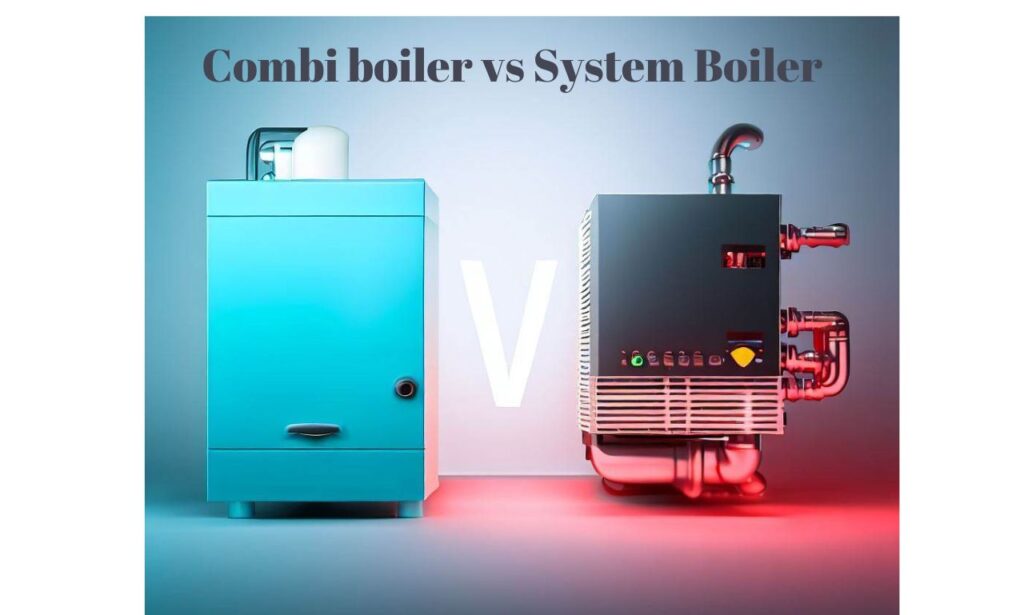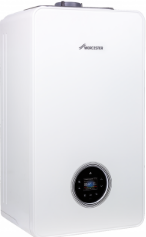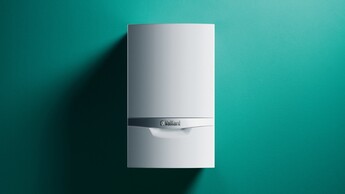
If you’re in the market for a new boiler, you’ve probably come across the terms ‘combi’ and ‘system’ boilers. While both types are designed to provide hot water and heating to your home, there are some key differences between the two. Understanding the pros and cons of each can help you make an informed decision about which one is right for your home.
Key Takeaways for combi vs system boiler
- Combi boilers are compact and don’t require a separate water tank, making them a good option for smaller homes or apartments.
- System boilers are better suited to larger homes or those with multiple bathrooms, as they can provide hot water to multiple taps simultaneously without any loss of pressure.
- Combi boilers are generally more efficient when it comes to heating water, as they heat the water directly from the mains supply. System boilers can be more efficient when it comes to heating your home, as they can be connected to a range of heating systems, including underfloor heating.
- Combi boilers are generally easier and quicker to install than system boilers, as they don’t require a separate hot water cylinder or cold water storage tank.
Combi boilers are a popular choice for smaller homes or those with limited space. They are compact and don’t require a separate water tank, making installation easier and more affordable. However, they may struggle to cope with high demand for hot water, and you may experience a drop in water pressure if multiple taps are used at the same time.
System boilers, on the other hand, are better suited to larger homes or those with multiple bathrooms. They require a separate water tank, but can provide hot water to multiple taps simultaneously without any loss of pressure. However, they are larger and more expensive to install than combi boilers.
What is a Combi Boiler?
If you’re looking for a new boiler, you may be wondering what a combi boiler is and whether it’s the right choice for you. A combi boiler, short for combination boiler, is a type of boiler that provides both hot water and heating without the need for a separate water tank.
With a combi boiler, the water is heated directly from the mains supply, which means that you don’t need to store hot water in a tank. This can be a real advantage if you’re short on space, as you won’t need a separate hot water cylinder.
Combi boilers are also known for their efficiency, as they only heat the water you need, when you need it. This means that you’re not wasting energy heating water that you’re not going to use, which can save you money on your energy bills.
One thing to bear in mind is that combi boilers may not be suitable for larger households, as they may struggle to provide enough hot water for multiple taps or showers running at the same time. If you have a larger household, you may want to consider a system boiler instead, which stores hot water in a cylinder and can provide hot water to multiple outlets at the same time.

What is a System Boiler?
If you have a larger home with multiple bathrooms, a system boiler may be the best option for you. A system boiler is a type of boiler that stores hot water in a cylinder, which is then distributed to taps and showers throughout your home.
One of the benefits of a system boiler is that it provides hot water to multiple outlets at the same time, without the need for a separate water tank. This makes it a good choice for larger households with high demand for hot water.
System boilers are also more efficient than traditional boilers, as they only heat the water that is needed, rather than heating a whole tank of water. This means that they are more cost-effective in the long run, as you will save money on your energy bills.
However, one downside of a system boiler is that it requires more space than a combi boiler, as it needs a separate cylinder to store the hot water. This can be a disadvantage if you have limited space in your home.
In summary, if you have a larger home with high demand for hot water, a system boiler may be the best option for you, as it provides hot water to multiple outlets at the same time and is more efficient than traditional boilers. However, it does require more space than a combi boiler, so you will need to consider whether this is feasible for your home.
- Boiler installation and maintenance service by Hometree: Offers professional installation and ongoing maintenance services for both combi boilers and system boilers. This includes regular inspections and repairs to ensure optimal performance and longevity.

Differences Between Combi Boiler and System Boiler
If you are considering a new boiler for your home, you may be wondering whether to choose a combi boiler or a system boiler. Both types of boilers have their advantages and disadvantages, and the choice you make will depend on your specific needs and circumstances.
Installation
One of the main differences between a combi boiler and a system boiler is the installation process. Combi boilers are generally easier and quicker to install, as they don’t require a separate hot water cylinder or cold water storage tank. This means that they take up less space and are often a good option for smaller homes or apartments. System boilers, on the other hand, require more space and can be more complicated to install, as they need to be connected to a hot water cylinder and a cold water storage tank.
Efficiency
When it comes to efficiency, both combi boilers and system boilers can be highly efficient, but the specifics will depend on the model you choose. Combi boilers are generally more efficient when it comes to heating water, as they heat the water directly from the mains supply. System boilers, however, can be more efficient when it comes to heating your home, as they can be connected to a range of heating systems, including underfloor heating.
Hot Water Supply
Another important difference between combi boilers and system boilers is the hot water supply. Combi boilers provide hot water on demand, which means that you can have a constant supply of hot water without waiting for a tank to heat up. System boilers, on the other hand, store hot water in a cylinder, which means that you may need to wait for the water to heat up before you can use it.
Space Requirements
Finally, it’s worth considering the space requirements of a combi boiler vs a system boiler. Combi boilers are generally smaller and take up less space, as they don’t require a separate hot water cylinder or cold water storage tank. This means that they can be a good option for smaller homes or apartments. System boilers, on the other hand, require more space and can be more complicated to install, as they need to be connected to a hot water cylinder and a cold water storage tank.
- Smart thermostats are compatible with both combi boilers and system boilers. These systems allow users to conveniently control and optimise your heating settings remotely, saving energy and enhancing comfort. Check them out on Amazon now.
Which One to Choose?
When it comes to choosing between a combi boiler and a system boiler, there are several factors to consider. Here are some things to keep in mind when making your decision.
Factors to Consider
- Hot water demand: If you live in a large household with high hot water demand, a system boiler may be a better option as it can provide hot water to multiple outlets at once. On the other hand, a combi boiler is a good choice for smaller households with lower hot water demand.
- Space: Combi boilers are generally smaller and more compact than system boilers, making them a good choice for homes with limited space. System boilers usually require a separate hot water tank, which can take up a lot of space.
- Installation: Combi boilers are generally easier and quicker to install than system boilers, as they don’t require a separate hot water tank. However, if you already have a hot water tank in place, it may be more cost-effective to install a system boiler.
- Cost: Combi boilers are usually cheaper to purchase and install than system boilers, as they don’t require a separate hot water tank. However, they may be more expensive to run in the long term, as they heat water on demand and can be less efficient than system boilers.
Pros and Cons
Combi Boiler
Pros:
- Compact and space-saving
- Quick and easy to install
- No need for a separate hot water tank
- Energy-efficient when used correctly
Cons:
- May struggle to provide hot water to multiple outlets simultaneously
- Can be less efficient than system boilers in certain situations
- Can be more expensive to run in the long term
System Boiler
Pros:
- Can provide hot water to multiple outlets simultaneously
- Usually more efficient than combi boilers in larger households
- Can be cost-effective if you already have a hot water tank in place
Cons:
- Takes up more space than combi boilers
- Requires a separate hot water tank
- More complicated and time-consuming to install
In conclusion, choosing between a combi boiler and a system boiler depends on your specific needs and circumstances. Consider the factors outlined above and weigh the pros and cons of each option before making your decision.
Comparison table: Combi boiler vs System boiler
| Feature | Combi Boiler | System Boiler |
|---|---|---|
| Hot Water on Demand | Provides hot water on demand, no need for a separate hot water cylinder | Requires a separate hot water cylinder, hot water is stored and heated in advance |
| Space Saving | Compact design, no need for a separate hot water cylinder | Requires additional space for a separate hot water cylinder |
| Installation | Quick and easy to install, fewer components to install | More complex installation, requires additional components such as a hot water cylinder |
| Energy Efficiency | Can be more energy efficient as there is no heat loss from a separate hot water cylinder | Can be less energy efficient as there may be heat loss from the separate hot water cylinder |
| Water Pressure | Water pressure may be lower, especially when multiple taps/showers are used at the same time | Water pressure is generally higher, especially when multiple taps/showers are used at the same time |
| Price | Generally less expensive to purchase and install | Generally more expensive to purchase and install |
Maintenance and Repair
When it comes to maintenance and repair, both combi boilers and system boilers require regular servicing to ensure they are running efficiently and safely. It is recommended that you have your boiler serviced annually by a Gas Safe registered engineer.
Combi boilers are generally easier to maintain as they have fewer components than system boilers. However, if a fault does occur, it can be more difficult to diagnose and repair as all the components are integrated into one unit. In some cases, it may be necessary to replace the entire unit.
System boilers have more components than combi boilers, which means they require more maintenance. However, if a fault does occur, it is usually easier to diagnose and repair as the components are separate. This also means that if a component needs replacing, it can be done without having to replace the entire unit.
Here are some maintenance tips for both combi and system boilers:
Combi Boilers
- Check the pressure gauge regularly to ensure the pressure is within the recommended range.
- Bleed the radiators annually to remove any trapped air.
- Check the flue for any obstructions or damage.
- Clean the condensate trap to prevent blockages.
System Boilers
- Check the pressure gauge regularly to ensure the pressure is within the recommended range.
- Bleed the radiators annually to remove any trapped air.
- Check the expansion vessel and pressure relief valve for any leaks.
- Inspect the pump and motorised valves for any signs of wear and tear.
In conclusion, both combi boilers and system boilers require regular maintenance to ensure they are running efficiently and safely. While combi boilers are generally easier to maintain, system boilers are usually easier to diagnose and repair if a fault occurs. It is important to have your boiler serviced annually by a Gas Safe registered engineer to ensure it is operating safely and efficiently.
Conclusion
In summary, when it comes to choosing between a combi boiler and a system boiler, there are several factors to consider.
Firstly, if you have limited space and want to save money on installation costs, a combi boiler may be the best option for you. It provides hot water on demand and doesn’t require a separate hot water cylinder, which can save space and money.
On the other hand, if you have a larger home with multiple bathrooms and a higher demand for hot water, a system boiler may be more suitable. It provides hot water to multiple outlets simultaneously and can be used in conjunction with a hot water cylinder to ensure a constant supply of hot water.
Additionally, if you live in an area with low water pressure, a system boiler may be a better option as it relies on a separate tank to provide water pressure, whereas a combi boiler relies on mains water pressure.
Ultimately, the decision between a combi boiler and a system boiler will depend on your individual needs and circumstances. It’s important to consult with a qualified heating engineer to determine which option is best for you.
Both combi boilers and system boilers have their advantages and disadvantages. It’s important to weigh up these factors and choose the option that best suits your needs and budget.
